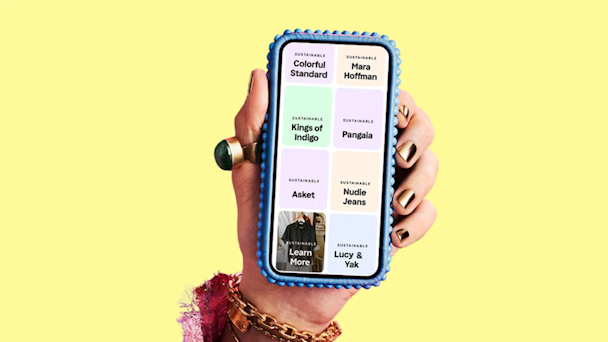How Klarna is trying to make sustainable living more inclusive
The platform’s head of sustainability tells The Drum how it plans to help consumers make better choices and participate in the circular economy.

Klarna’s recent partnership with Reddit encourages customers to make sustainable purchases / Klarna
After three years on the sustainability team at Zalando, Salah Said made the move to ‘buy now, pay later’ platform Klarna in 2021 to become its head of sustainability. “It’s been a journey so far, but Klarna is a very fast-paced company so it’s been great to see progress so quickly."
He explains at the start of Klarna’s climate journey it started off with the basics, from materiality analysis to ESG reporting (which the platform has been doing since 2017) and "quickly identifying the low-hanging fruits.”
Sustainability has now become an integral part of Klarna, he says: “From our own carbon footprint to enabling our customers to make more sustainable choices.”
Advertisement
But Said goes on to highlight there are difficulties in decarbonizing a pre-existing business model. “Some companies are inherently more sustainable from the start. If you look at us compared to manufacturing companies, we have relatively low emissions. So our sustainability perspective has to focus on the fact that we have150 million global active consumers and over 500 000 global retail merchants.”
These emissions that fall outside a company’s internal operations, but extend beyond its value chain are the difficult Scope 3 emissions that brands will often struggle to identify and neglect to tackle.
But Said says it’s a key component of Klarna’s ESG strategy. “While we have to make our own operations more sustainable, we also have to start minimizing our carbon footprint and supporting projects outside our operation. This is where I think our approach is unique, it’s about using our clout to drive sustainable development outside our business.”
Advertisement
Making climate action inclusive
Said explains this ethos is reflected in Klarna’s own products and services, which are “all about enabling our customers to make sustainable choices.”
He says the platform has gone to great lengths to develop features that give customers information on the brands they are shopping for, “and at the product level, to help them navigate the variety of products and services we offer.”
Klarna believes this will help consumers vote with their wallets, although it of course still carries brands with a wide variety of environmental impacts.
It’s also currently putting in new efforts to encourage customers to buy secondhand and re-sell on the platform. “On the one hand we need to highlight sustainable products and brands, and on the other, we need to enable consumers to contribute to circular services,” Said says.
Suggested newsletters for you
The feature is currently only available in Sweden, but Said says if it is successful it hopes to roll the feature out across multiple locations.
An objective for the brand now is enabling customers to use it to make more sustainable financial decisions. During Earth Week, for example, it announced its partnership with Reddit to launch its ‘But It For Life’ list – items of the year, based on insights from the subreddit r/BuyItForLife’s 1.4 million subscribers.
While the brand’s flexible payment capabilities, “allows more people to actually be included,” says Said.
The key question Klarna faces though is whether encouraging people to buy more items using credit (even if they are sustainable), rather than waiting till they had the funds to purchase, goes against this ESG ethos. Said declined to comment, instead directing The Drum to a spokesperson.
“We believe people should pay with the money they have first, but when it makes sense to use credit, our interest-free products offer a fairer alternative. With the initiative, we aim to inspire shoppers to buy items that last longer, compared to buying low-quality products that may quickly end up in landfill, and in extension may benefit people’s wallets as well as the environment, " they said. "These items may be more expensive in the short term, but in the long term customers will end up spending less - so this is a perfect example of how our products can help customers make more sustainable choices here and now.”
Said concluded that Klarna, ultimately, can help make sustainable choices more inclusive.
“If you want to make an investment in a high-quality piece then individual circumstances may not allow you to participate. This is a more inclusive way of democratizing sustainability and allowing them to participate.”
An approach beyond offsetting
Klarna announced its plans to become carbon neutral in 2019, with decarbonization targets including a 50% reduction by 2030 and net zero by 2040. “But ultimately we want to maximize the impact of every dollar we invest in climate action,” Said continues.
Based on the World Wildlife Federation and Boston Consulting Group blueprint for corporate action on climate and nature, Klarna enforces an internal carbon tax, meaning it taxes itself for its own carbon emissions and invests that money in high-impact climate projects.
It extends “beyond just offsetting emissions,” Said explains. Fortunately, the practice and its role in companies’ net zero strategies is becoming more heavily scrutinized due to questions over its scientific validity and lack of regulation.
“Instead of just buying cheap offsets Klarna supports the Climate Transformation Fund,” Said says. “That focuses on decarbonization, climate advocacy and carbon removal, and we buy artificially high-priced carbon credits from companies that are at the cutting edge, and have scalable technology.
“We don’t really believe in the carbon neutral claim, we believe if we support the projects that we’ll all need in the future, now, then they become cheaper and more accessible for other companies, our partners and anyone who wants to contribute to climate action.”

